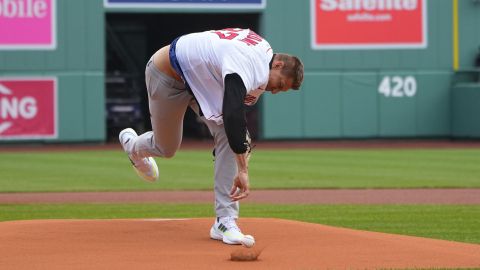Red Sox slugger David Ortiz blasted a three-run homer in the seventh inning of Thursday’s game against Oakland to give the Sox a 6-5 lead and, eventually, an 8-5 win.
The bomb came just a few hours after another bomb was dropped on Ortiz and the Red Sox: Ortiz tested positive for performance-enhancing substances in 2003, and his name was leaked from the list of 104 players who did so during that round of testing.
The tests were done to determine if Major League Baseball did in fact have a drug problem. The players were told they would remain anonymous and the results would be destroyed once the findings were complete.
The list was never destroyed and has apparently gotten into the hands of someone who feels like releasing a few names from the list every now and then.
Why is this happening now — and happening in this way? Why are a few names getting leaked here and there? Why are the names being leaked at all? This was supposed to be sealed information.
The information came out a little more than an hour before game time. About four and a half hours later, when the game was over, the number of media at Fenway Park had grown exponentially. National networks and news outlets were all waiting to storm the Sox clubhouse and hear what Ortiz had to say.
He didn’t say much, except that he was told he failed the test. He said he was going to find out what he tested positive for and talk with the media once he had more information.
I asked him if he thinks all the names should be released so that baseball can deal with this all at once and be done with it. He didn’t say much about the others, instead saying he would deal with his own issue in the coming days.
I also asked his teammates what they thought about the names getting leaked in the manner that they have been. Kevin Youkilis said the trend is ridiculous because it is like emphasizing a black eye on the sport, and it's hurting the game.
Mike Lowell said it might help to just get all the names out there and be done with it. But he also pointed out that less than 10 percent tested positive for PEDs, and he wishes people would focus on the 90 percent who were clean.
Dustin Pedroia also raised an interesting point: Maybe the other names shouldn’t be released because the testing was supposed to be anonymous and the results sealed. None of the names should have been leaked. He followed that up with a typical Pedroia line: “I don’t know. I was in college hitting rockets in 2003.”
All of these points are valid. Is it fair to Ortiz, Manny Ramirez, A-Rod, Barry Bonds and a few others that their names were released but not the rest? No, it’s not. But does that mean the other 100 players should be outed as well? No, it doesn’t.
In 2003, steroids were not banned in baseball. They are now. We can’t fault people for doing something they thought they needed to do in an era when it was acceptable. We cannot change the past; we can only do what is possible to keep the game clean now and in the future.



